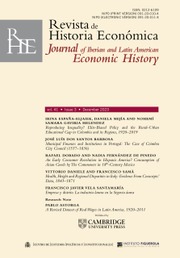Article contents
El desarrollo del primer capitalismo a pesar de los metales preciosos del Nuevo Mundo: Una interpretacion anti-Wallerstein de la España Imperial
Published online by Cambridge University Press: 28 April 2010
Extract
Segün ciertos autores, el capitalismo empezó a adquirir su forma moderna cuando los Estados del «Centro» de Europa occidental establecieron una hegemonía comercial en la economía mundial de los siglos XVI y XVII. El trabajo forzado de la «Periferia» (primordialmente Latinoamérica y Europa oriental) creaba excedentes económicos que eran posteriormente transferidos a Inglaterra, los Países Bajos y el norte de Francia. La labor de los que proponen dicha idea es, por consiguiente, descubrir y explicar la índole de este dilatado proceso. Los defensores más conocidos de esta interpretatión son André Gunder Frank e Immanuel Wallerstein. Frank sostiene que el actual subdesarrollo de los países pobres ha sido efecto del desarrollo económico de la «metropoli» (es decir, el Centro). Wallerstein añade la opinión complementaria de que el moderno desarrollo capitalista es imputable a muchos siglos de extractión del excedente de la Periferia.
- Type
- Articulos
- Information
- Revista de Historia Economica - Journal of Iberian and Latin American Economic History , Volume 2 , Issue 2 , September 1984 , pp. 29 - 57
- Copyright
- Copyright © Instituto Figuerola de Historia y Ciencias Sociales, Universidad Carlos III de Madrid 1984
References
BIBLIOGRAFIA
- 2
- Cited by




